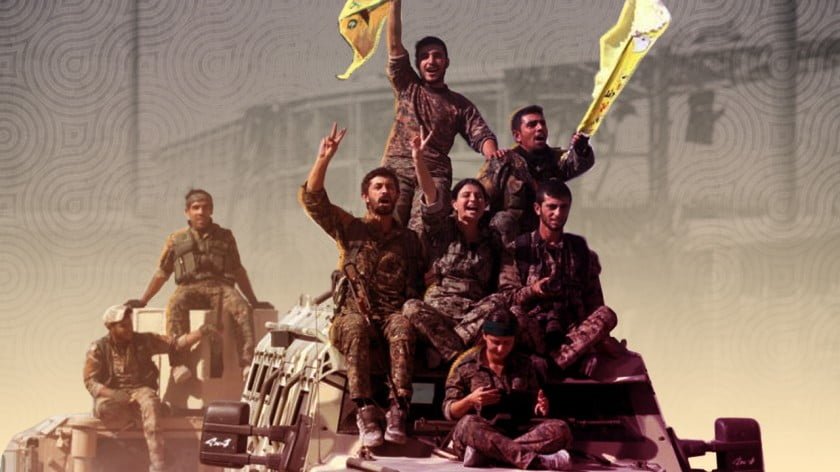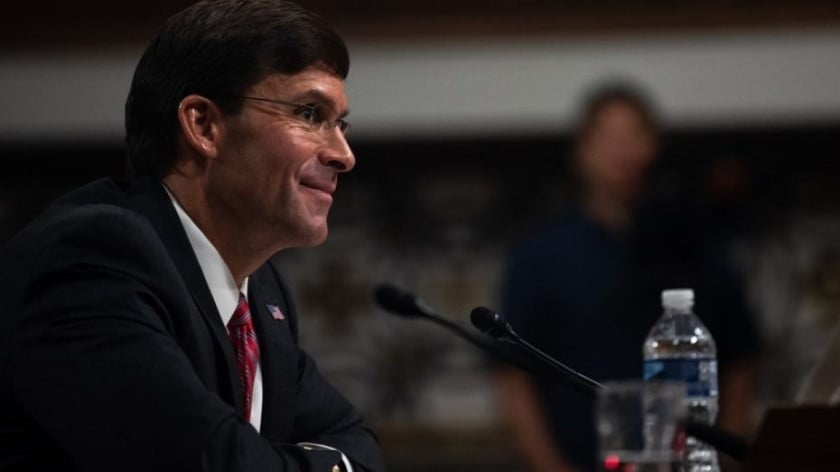Syria – Turkey Fails in Idleb, Is Unwilling to Take the Northeast
The neoconservatives in the Trump administration, Secretary of State Mike Pompeo, National Security Advisor John Bolton and the Syria envoy James Jeffery, are scrambling to save their plans for Syria that President Trump disposed of when he ordered a complete retreat.
Those plans were for a permanent U.S. occupation of northeast Syria, the reduction of Iranian influence within the government held parts of Syria and an eventual disposal of the Syrian government under President Assad through negotiations. These were unicorn aims that had no chance to ever be achieved.
Moreover Trump had never signed off on these ideas. Back in April he had announced that he wanted U.S. troops out of Syria. He gave his staff six month to achieve that. But instead of following those orders Pompeo and Bolton tried to implement their own plans:
Late last year, some of the president’s hawkish advisers drafted a memo committing the United States to a longer-term presence in Syria that included goals of an enduring defeat of the Islamic State, a political transition and the expulsion of Iran, officials said. The president has not signed the memo, which was presented to him weeks ago.
In fact, Trump had warned his aides for months that he wanted out of Syria in short order.
…
Bolton’s Iran plan never really took effect at the Pentagon, where officials were not officially tasked with any new mission in addition to the operation against the Islamic State. Military officials likewise viewed Iran’s expansion into Syria as problematic, but they were skeptical about the lack of a clear legal justification that would be required for offensive military action against Iranian-backed forces.
Trump recognized that those plans were nonsense and ordered to end them. In that process he came up with a likewise unicorn idea – to hand northeast Syria to Turkey to fight the already defeated Islamic State. Turkey does not want northeast Syria. It does not want to risk a bloody war against the Kurds that would be required to sustain such an occupation.
The only appropriate solution is to hand control of northeast Syria (yellow) back to the Syrian government (red). Damascus would disarm the Kurds or integrate them within its national army. They would be under control and no longer a threat to Turkey. Everyone could live with such an easy solution.
Everyone but the neocons.
Today National Security Advisor Bolton is on his way to Israel to cook up new plans:
A Trump administration official told reporters traveling with Bolton that Bolton intended to discuss the pace of the drawdown, as well as American troop levels in the region. Bolton was expected to explain that some U.S. troops based in Syria to fight IS will shift to Iraq with the same mission and that some American forces may remain at a key military outpost in al-Tanf, in southern Syria, to counter growing Iranian activity in the region.
Bolton’s also was to convey the message that the United States will be “very supportive” of Israeli strikes against Iranian targets in Syria, …
I bet that neither of those points was signed off by Trump. The publication of these ideas is another attempt by Bolton to push his personal policies to the front.
Erdogan, asked by Trump to take northeast Syria but unwilling to do so, raised demands that the U.S. is unlikely to fulfill:
Turkey is asking the U.S. to provide substantial military support, including airstrikes, transport and logistics, to allow Turkish forces to assume the main responsibility for fighting Islamic State militants in Syria, senior U.S. officials say.
The Turkish requests are so extensive that, if fully met, the American military might be deepening its involvement in Syria instead of reducing it, the officials added.
Bolton will later fly to Ankara and discuss the Turkish plans:
Participants will include White House national security adviser John Bolton; Gen. Joe Dunford, the chairman of the Joint Chiefs; and James Jeffrey, the State Department envoy for Syria.
One U.S. official said the administration is unlikely to provide all of the military support the Turks are seeking, especially on air support.
Without U.S. air support Erdogan can not attack northeast Syria. The Turkish air force is weak. Many of its experienced pilots were fired for alleged support and involvement in the coup against Erdogan. The airforce is unable to provide the necessary 24/7 support its soldiers would need. There is also strife within the Turkish army command. If he would order an attack, Erdogan would only go for the Kurdish areas along the northern border, not for the Islamic State. That again is something the U.S. does not want at all:
Many experts and officials also fear the Turks may target Kurdish fighters who have long provided the U.S. with solid support in the campaign against Islamic State militants and endured considerable loss of life.
To try to mitigate these risks, Mr. Jeffrey, the State Department envoy, is seeking to forge an arrangement with the Turks that would allow them to enter northern Syria while avoiding largely Kurdish areas, say U.S. officials familiar with the plans.
Mr. Jeffrey and his State Department team have created a color-coded map of northeastern Syria in an attempt to negotiate a power-sharing plan that could avert a costly Turkish-Kurdish fight in the area. … One former U.S. official described the map as “Sykes-Picot on acid,” …
The idea is delusional. There are no borders between Kurds, Arabs and other ethnicities in northwest Syria. The populations is mixed. Only the ethnic percentages vary from town to town. Implementing the idea would lead to ethic cleansing and an everlasting war.
The Kurds are no longer willing to follow the U.S. lead.
Mr. Jeffrey has asked Gen. Mazloum Abdi, the Kurdish commander of Syrian fighters, to hold off on making any deals with President Bashar al-Assad’s government while the Trump administration tries to develop its strategy.
“F*ck you,” said General Abdi, as the Kurds continue to negotiate:
Syrian Kurdish leaders aim to secure a Russian-mediated political deal with President Bashar Assad’s government regardless of U.S. plans to withdraw from their region, a senior Kurdish official told Reuters.
The Kurdish-led administration that runs much of northern Syria presented a road map for an agreement with Assad during recent meetings in Russia and is awaiting Moscow’s response, Badran Jia Kurd, who attended, said.
A deal between the Kurds and the Syrian government “is inevitable” says a senior Kurdish military official. The U.S. proved again to be unreliable and the Kurds have nowhere else to go.
None of the new plans and ideas Bolton presents make any sense. They are unlikely to have Trump’s blessing. While the U.S. retreat from northeast Syria may be delayed another month or two, it will likely proceed.
The last week saw new developments in Idleb governorate. Idelb is largely ruled by the al-Qaeda organization Hayat Tahrir al Sham (HTS), the former Jabhat al-Nusra. There are also many other groups under Turkish control. But Turkey had recently transferred many of those fighters to attack the U.S.-Kurdish held Manbij at the Euphrates. That attack was stopped when the Syrian army took control of the area.
While the Turkish supported groups in Idleb were weakened, HTS used the occasion to reinforce its control. On Monday HTS (grey) attack the areas west of Aleppo which were held by Nour al-Din al-Zenki. The once CIA supported Zenki became ‘famous’ when in 2016 some of its fighters published a video in which they beheaded a sick ten year old boy for no discernible reason.
During the last five days at least 130 people were killed in the Idleb fighting. Zenki was eliminated from the area it held (stripped grey) and its remaining fighters fled to the northern Afrin canton which is under Turkish army control. HTS took control of Zenki’s heavy weapons including four tanks.
HTS now controls all areas next to Turkey and the Turkish controlled Afrin. It sent ultimatums to other groups in Idleb and demanded additional control over the towns Maarat al-Nu’man and Ariha in the south of the governorate. As none of the other groups can withstand HTS it will likely soon control these towns. Taking them gives HTS full control over the M4 and M5 highways. Control of the highways can be used to generate money and as an asset in future negotiations.
The Astana agreement between Russia and Turkey over Idleb stipulated that HTS would be pushed back 15 miles from the government held areas. The M4 and M5 highways would be reopened to traffic for government traffic. Turkey was supposed to implement and guarantee those points. Not one of these points has been achieved. The Turkish soldiers stationed in six observation posts around Idleb governorate are hostages to HTS. As Turkey failed to deliver on its promises Syria and Russia have all rights to ignore the agreement, attack HTS and to liberate Idleb.
That Turkey failed in Idleb makes it more likely that it will refrain from invading northeast Syria. Its army positions in Syria are already in trouble. Why add new ones to the mess?
By b
Source: Moon of Alabama









